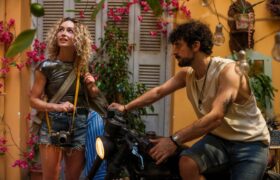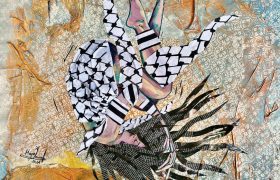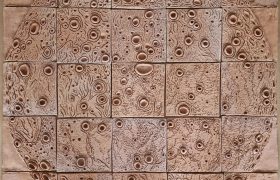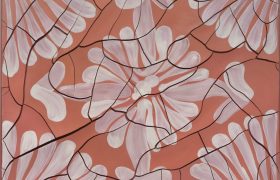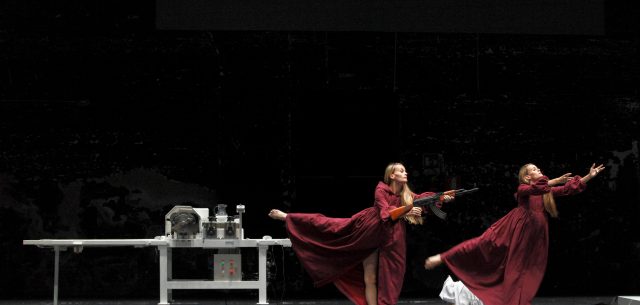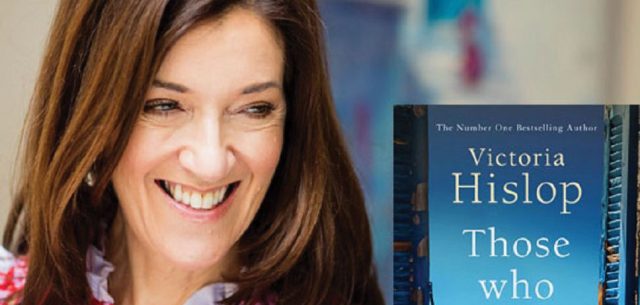Taking cultural diplomacy to the streets
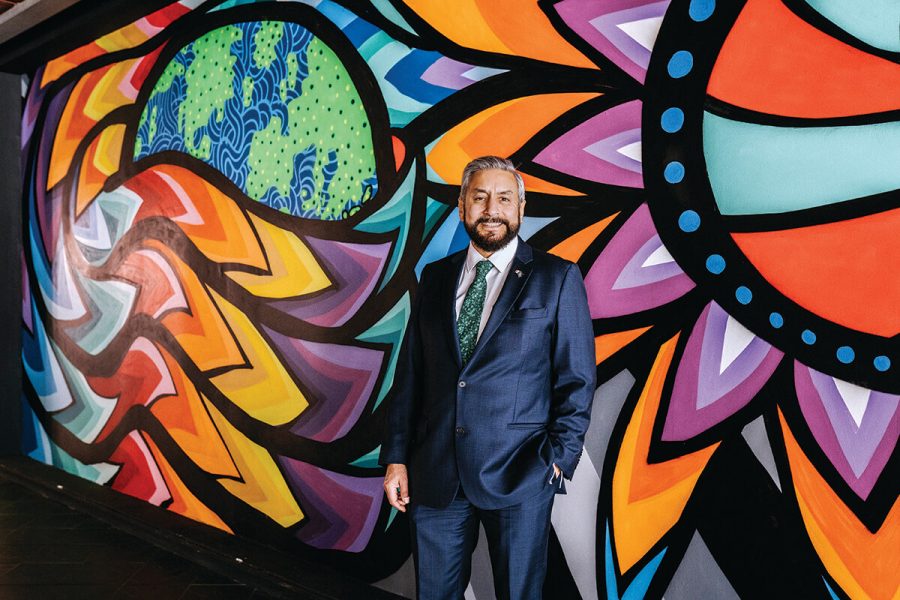
H. E. Ambassador of Mexico to Greece Daniel Hernandez, in front of a Mexican mural at Eirini Metro station.
From murals at metro stations to Mayan medicine and Mexican cinema, Mexican Ambassador Daniel Hernández hopes to leave a permanent cultural imprint on the minds and hearts of Greeks. In a frank interview with Sudha Nair-Iliades he talks about trade, immigration, gay rights, and on why he finds Exarcheia’s gritty character so appealing.
When Mexico’s Ambassador to Greece, Mr Daniel Hernandez, arrived two years ago, he immediately established that his brand of diplomacy wasn’t limited to closed doors and high desks. Hence the rather unusual choice of venue he suggested for our interview: Eirini metro station. Against the backdrop of an art wall spray-painted by Greek and Mexican muralists, our conversation punctuated by the stationmaster’s announcements, the ambassador explained that the idea of a cultural encounter was to take art to a public space, using a medium that was relatable in both countries. One commuter described the murals as ‘tattoos on shared social skin’. That is exactly the kind of reaction the ambassador had hoped the works would elicit: a sense of mutual proprietorship, of walls speaking the same language, and a near-permanence to the relationship; making streets into museums and brick into messages.
You’ve been very active in promoting cultural ties beyond the confines of museums and galleries – like this interactive young artists’ exchange. Why street art, and why at a metro station?
Greece and Mexico are similar in that we are both ancient civilizations but at the same time we are eager to embrace contemporary art, thoughts and debate. We are both things, ancient and modern, and we bring our history and cultural legacy into our contemporary art. The elements that brought this project about was the connection of youth.
Young Greeks like to express their thoughts, their feelings and their reactions to the world around them publicly, on the walls. They paint walls. So, we brought artists from both countries to do exactly that. To share their art publicly, and that’s how the idea of a collaborative effort with Greek artists was formed. It was interesting to see how the two sets of artists recognized the similarities between our two countries but also how they approached their art artistically and intellectually.
We wanted the maximum number of people to see it by placing them in public places. It is symbolic that the metro station is called Eirini or Peace, and that it is the entry point to the stadium that hosted the Olympic Games, itself a promoter of the values of solidarity, friendship and sportsmanship.
What other cultural highlights can we look forward to in 2019?
As always, we will have a strong showing at the Thessaloniki Film Festival. In fact, the Thessaloniki Film Festival had the vision to select Roma and present it along with a series of other very good Mexican films to a Greek audience, long before it cornered all the Oscars and BAFTAs. There will be more film screenings, perhaps even a Mexican film festival.
We will also be participating at the LEA festival, the festival of Latin American literature in which all the Spanish and Portuguese-speaking countries participate but where Mexico always has a guest author present to speak about contemporary Mexican literature. We will also be inviting a Mayan healer who’ll speak on their perception of cosmology (there is a lot of interest in Greece) but also showcase Mexico’s pluralistic society. We speak over 60 indigenous languages in the country and we have bilingual and bi-cultural education for each of these languages.
As last year, we also have plans to support the local Mexican community in celebrating The Day of the Dead, when around 600 people joined the parade in Plaka and Thisseio.
Immigration
You mentioned the film Roma, a Mexican story of scale, scope, and intimacy with a political and universal message that highlighted immigration in the midst of the ‘Wall’ rhetoric. What sentiments have been expressed to you by Mexicans about Greece’s refugee crisis?
Again, both Mexico and Greece are similar when it comes to immigration as they are both places of transit. In our case, it’s migrants who want to go to the US; in Greece, it is migrants who want to head to other parts of Europe. We receive migrants who are fleeing from different kinds of violence – social, political or physical. And both our countries have policies of open arms, of defending human rights, empathy for what these migrants are going through, and an organized society keen to help them – both here and in Mexico.
Mexico has had Greeks living in Sinaloa since the 18th century. How does this influence the connection between our two countries?
Most of it is connected to the seafaring characteristic of Greeks and that explains why the Greek community is concentrated around Sinaloa which is an important port in the Pacific, as well as why most Mexicans married to Greeks hail from these coastal towns!
But there’s another history and that has to do with the elites and the intellectual side of Mexico where the understanding of classics, the study of Ancient Greek language and Greek philosophy is fundamental to Mexican thought.
A lot of Mexicans living in Greece are an intellectual group of artists, writers, thinkers and creative personalities who were attracted by the history of the Athenaeums (centres of study of Greek thought and philosophy) in Mexico. So, we have a lot of interaction with people from the fields of literature and theatre who’ve made Greece their home. They remain very active in Mexican literature, in Spanish theatre, or plays translated into Greek, and of course, music. So, the community is extremely active in the arts. Your readers should follow us on social media to keep up to date with all the activities – not just those promoted by the Embassy – but those of the Mexican community
Trade and Economy
You mentioned that most people perceive Mexico to be an agricultural country when it is, in fact, an industrial nation.
I am surprised at how little we know of each other and of how little we are aware of our contemporary reality. We are an industrial nation. We are not a commodities country. We are a manufacturing nation. Few people know that we are the first producers of flat screens in the world, or that we are the seventh producer and fourth exporter of automobiles. We are major players in the aerospace industry. I’m working on finding a partnership with business people in Greece so that we use our experience in automobile manufacturing and aerospace and bring it to ship-building.
We do compete in the agricultural sector where we are the main producers of avocados and limes, for example, but we are essentially an industrial nation. We are one of the most connected, open economies in the world with trade agreements with 46 countries. Around 70% of our GDP depends on international trade and most of this is in industrialized products. We are now graduating over 120,000 engineers every year, so it also has to do with the human capital of the country. Mexicans are very creative in the arts, but we are also becoming a powerhouse when it comes to science and technology.
Ambassador, what about reinforcing trade ties with the EU, given the rather tenuous relations with the US?
Mexico has always wanted to diversify and certainly one of the weak aspects of our economy has been the concentration, as huge as it is, on one single market, that is our relationship with the US which comprises almost 75% of our imports and exports. So, diversification would give us some stability. Recent events have brought that issue back into light and triggered an internal discussion in Mexico on doing something about it. We just renewed our global agreement with the EU. We have USD 62 billion of trade with the EU and we expect trade with the new agreement to grow significantly.
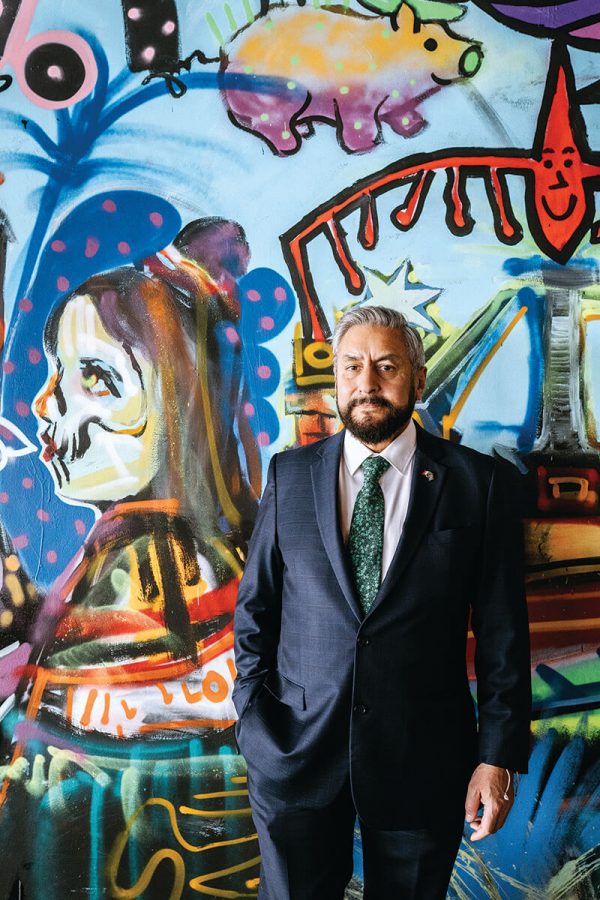
Your posting here coincides with Greece easing its way out of a ten-year crisis. With Brexit looming and the European elections likely playing on questions of identity, how much has all this informed your daily duties and reports back to Mexico?
I am certainly reporting, and I think the world is certainly more dynamic. At least, nobody is getting bored! There is a tremendous amount of uncertainty: the world has changed dramatically; it has changed technologically, but it has also changed in very positive ways. We need to think about the reduction of extreme poverty worldwide, the reduction of hunger worldwide in the last 20 years, and these issues need to be continued to be looked at what international cooperation has managed to achieve. I think the outlook is extremely positive. As long as we keep our eye on the ball – which is reducing inequalities and improving the quality of life of the majority of the population – all other issues will iron themselves out.
Inclusion
You’ve been active in supporting Athens Pride and LGBTQ rights in Greece. What shocks or encourages you with reference to homosexual rights in Greece?
The interesting thing is that you have this idea of Europe being at the forefront of human rights and then we find that many Latin American countries, not just Mexico but also Brazil, Argentina, Uruguay etc have marriage equality, non-discrimination laws, protection against discrimination, and to some degree it is a bit of surprise. On the other hand, it becomes a matter of pride how in our own culture and societies, we have been able to address these issues which are very difficult, and we are very happy to share the experience. We think that each culture has to have its own pace, its own reality, its own timing according to its own history, its social composition and the role and weight of its own social actors. It should not be forced upon the world but rather encouraged and worked on together internationally rather than individually. That is why with Athens Pride, as well with all other issues dealing with human rights, such as rights of migrants, Mexico will continue to be a loud voice on the issue.
You and Greece
What is the best perk of being stationed in Greece?
The people, the music, the art, the dancing – I still haven’t learned to dance! Prospatho, I’m trying!
Which place in Greece has inspired you most?
I have travelled all around Greece, but not enough. The more I travel, the more I find out about places I need to visit. So, it seems like an endless endeavor. I like Halkidiki, Thrace and Macedonia, I’d love to go back to Skopelos, Tinos – each of the islands and destinations have their own secrets waiting to be discovered and it is for each person to find out which are the secrets that speak to them.
Your favourite corner in Athens?
As much as I like to walk the tourist trails of Plaka and Monastiraki, Psyrri and Gazi, I love to walk in Omonoia and Exarcheia and all these other grittier places that speak to the Athens of today, the Athens of immigration, of youth, the Athens of artists, of social conflict, of social thought. Generally, the places where you can feel the life of Athens of today.
Finally, Ambassador, what would you like your legacy in Greece to be?
I don’t think of how I want to be remembered; rather the other way around, of how much of Greece I will keep engraved in my heart and will take with me forever. As a diplomat I travel a lot, but some places stay tattooed in your heart and Greece is one of them.
What I’d like to leave is the desire and enthusiasm to continue to do works that stay, that will always be present, and will continue to reinforce the connection between the two countries.


